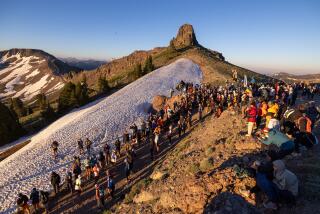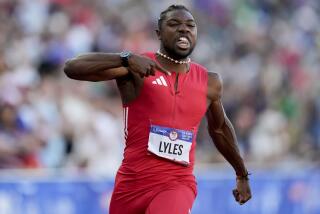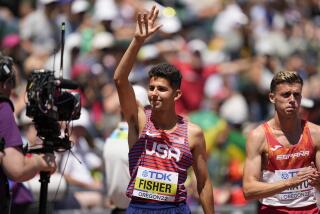JOHN WALKER : A Shot at 100th Sub-4-Minute Mile Keeps This New Zealander Going
- Share via
John Walker, the New Zealand distance runner, turned 33 last Saturday. The question burned as brightly as the candles on his birthday cake.
“Each year I ask myself if I still think it’s possible to run a sub-4-minute mile,” Walker said Wednesday. “It’s kind of my private challenge.”
Walker, who already knew the answer, did not have to wait long to affirm it.
He ran 3:56.8 in a mile race at Auckland, his hometown, the next day. It was his second sub-4-minute mile of the week, his fifth in a month and the 94th of a remarkably long career.
Now, at an age when most athletes are thinking of retirement, Walker is closing in on an unprecedented accomplishment.
A dozen years after running his first sub-4-minute mile, and 10 years after becoming the first ever to run a mile in less than 3:50--he did it in 3:49.4--Walker is about to become the first ever to register 100 sub-4-minute miles.
He may get his 95th Friday night in the Sunkist Invitational at the Sports Arena. Walker’s competition includes Eamonn Coghlan, the indoor mile record-holder, and Steve Scott, who has run 88 sub-4-minute miles.
Walker’s duel with Scott to reach 100 provides the new season with a race within a race. It is a milestone Walker covets. He compared it to Roger Bannister’s breaking of the 4-minute barrier, Bob Beamon’s long jump of 29 feet 2 1/2 inches and the ascent of Mount Everest by Sir Edmund Hillary.
“College kids dream about running a sub-4-minute mile, and here I am about to become the first ever to run 100,” he said.
“If you had said to Bannister after he had run that first 4-minute mile that someday, someone will run 100 of them, he’d have probably said you have to be dreaming.
“Now it’s about to become reality, and I would have to consider it quite a milestone, an achievement I would take particular pride in. It’s an honor to be first in any category, particularly one measuring longevity and success.”
Walker could be at 98 by the time he returns to New Zealand on Feb. 1. He will run in an indoor meet at Johnson City, Tenn., Saturday night, followed by meets in New York and Toronto the next weekend. Scott has 12 indoor meets scheduled between the Sunkist and Feb. 24.
“Steve asked me to wait for him so that we could go head to head,” Walker said with a laugh. “But I figure I have to have it settled by Feb. 17 or it could get tight. He’s hoping that I’ll miss one somewhere and I’m hoping that he’ll miss somewhere.”
Walker had planned a longer, more financially rewarding indoor campaign in the United States but decided that he should run No. 100 in New Zealand, where the outdoor season is in full swing. His goal is a Feb. 17 meet in Auckland. The race will be televised nationally, and a civic celebration will commemorate the accomplishment.
“I could make a lot more money running in the U.S., but there comes a time when money has to give way to the aspect of posterity,” Walker said.
“New Zealand is where I first began to run and where I hope to live for another 40 or 50 years. The possibility of my reaching 100 seems to be a monumental thing there now, and I feel that doing it at home is what I should do, what I want to do.”
In continuing a distance-running tradition promoted by countrymen John Lovelock, Peter Snell and Rod Dixon, the gregarious Walker said his name has become known in virtually every New Zealand household, his face as recognizable as the prime minister’s.
His TV commercial for a languishing apple juice boosted sales 1,000%, he said. He regularly puts on clinics and makes appearances for a home-loan association. He and wife Helen live on a 10-acre spread with their children, Elizabeth, 5, and Richard, 13 months. They own four race horses.
Neither fame nor riches, however, have been Walker’s primary motivations. “When I’m out on a Sunday running for 2 1/2 hours and feeling like death, I’m not thinking of a payday, I’m thinking of winning,” Walker said. “I’m no purist, but I’ve always been less money oriented than running oriented. The changes have made it easier for my family, easier for me to continue training, but it has really been just the last two years, and I’m still not in the top echelon. Someone like Mary Decker makes more in one year than I do in six.”
Walker estimated that he has run more than 50,000 miles during a career in which he won the 1,500 meters at the 1976 Olympics in Montreal, did not compete at Moscow in ’80 because of New Zealand’s participation in the U.S.-led boycott and finished eighth in the 5,000 meters at last summer’s L.A. Games.
The 5,000 is a secondary event for Walker, who said he chose it because of a belief that it would be more to his tactical advantage than the 1,500, in which the competition included Sebastian Coe, Steve Ovett, Steve Cram and Scott.
The tactics turned around on Walker, however, and he probably would have fared better in his metric specialty, the 1,500.
“I gambled and lost,” he said. “But I don’t regret it. I did the best I could. My time (13:24.46) would have been good for a medal in many previous 5,000s, but this was one of the fastest ever. They ran away and hid on me.”
The victory by Morocco’s Said Aouita in an Olympic-record 13:05.59 did not diminish Walker’s belief that he is capable of running as fast and aggressively as he did 10 years ago. “The only difference is that I can’t bang out three or four races in a row like I did then, and that everytime I race in Europe now I have to run something like a 3.50 to win rather than 3:56.”
Asked to list the keys to his longevity, Walker cited:
--An escape from early burnout because he did not begin to run the mile seriously until he was 20.
--Ability inherited from an athletic father who had to sacrifice his competitive desires for financial survival during the Depression.
--The contributions of Coach Arch Jelly. “No matter when I want to peak, he can get me there.”
--Interests that provide a diversion from the intensities and frustrations of running.
--A high motivational level.
“I’m very goal oriented,” Walker said. “If I set my mind to something I can usually do it. I hate training, but I enjoy the racing, the thrill of winning and the competitive camaraderie. If I had merely picked my spots over the years I could have retired in 1977 recognized as one of the greatest athletes ever, but I never wanted that.
“I’ve only wanted to run, to be part of it. I’ve been willing to run anywhere against anyone. The records and the Olympics are just something that go along with that. You leave yourself vulnerable to defeat when you run with the frequency that I have, but that’s the way I’ve wanted it.”
Walker’s perseverance received its most severe test during the late 1970s when a mysterious circulation problem in his right leg restricted his training for nearly four years and sent him to vascular specialists, faith healers, psychologists and chiropractors. He ultimately had an operation in 1982 that freed a pinched artery.
It is likely that Walker would have had his 100 by now had he been healthy during those years and he said he would also have had them had he been more serious about running indoors. Coghlan, in a Times story Wednesday, said Walker “seems to crumble” in his mental approach to the boards.
Walker, who estimated that he has run only 14 of his sub-4-minute miles indoors, laughed and said that Coghlan was just trying to psych him. He said the indoor season is everything to Coghlan and that only in America is emphasis put on it.
“Why should I be sitting around a hotel with snow on the ground outside, when I can be running in 80 degrees at home?” Walker asked. “Most of the time I’ve taken a 20- to 30-hour flight here (the United States) and run the next night.
“Some of the indoor tracks are too tight for me, but it isn’t a matter of crumbling. It’s a matter of not giving myself time to acclimate, not giving myself the best shot. This is one of the few times I’ve come four or five days early.”
More to Read
Go beyond the scoreboard
Get the latest on L.A.'s teams in the daily Sports Report newsletter.
You may occasionally receive promotional content from the Los Angeles Times.










